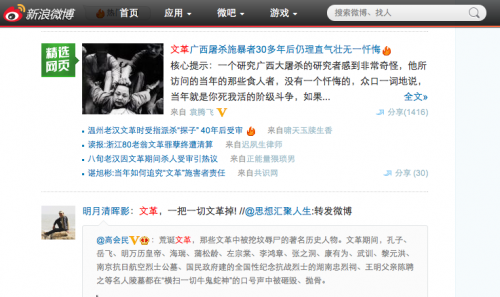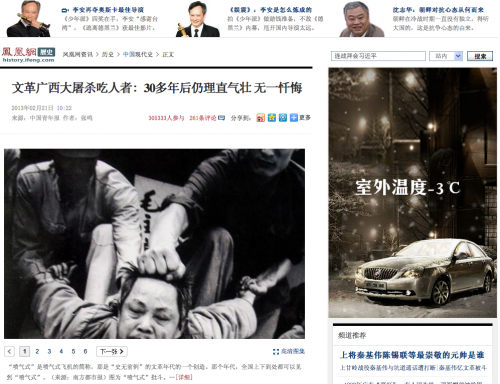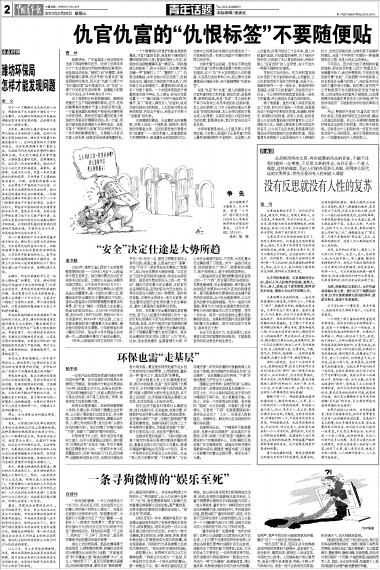The trial last week of a man accused of murdering a doctor during the Cultural Revolution has generated some interesting discussion of this sensitive episode in China’s history, both on social media and in traditional media.
Approved by the 11th Central Committee of the Chinese Communist Party in June 1981, the Resolution on Certain Questions in the History of Our Party Since the Founding of the Republic offered a review and assessment of the first 32 years since the founding of the People’s Republic of China. The resolution rejected the Cultural Revolution, saying it had been “initiated in error by [Party] leaders and manipulated by counterrevolutionary cliques, bringing grave disaster and internal chaos to the Party, the nation and our people.”
But the resolution’s formal rejection of this painful decade was not an invitation for Chinese to reflect back on its evils and their political, cultural or institutional causes. The Cultural Revolution has remained a highly sensitive issue ever since, and coverage by the news media is carefully controlled, particularly around the May anniversary of its inception.
On February 20, the official China News Service reported that an elderly man in Zhejiang province, identified only by his surname, Qiu, was facing trial for his alleged murder in 1967 of a doctor accused at the time of being a spy.
The news of Qiu’s trial generated a great deal of discussion on Chinese social media. While some Chinese welcomed the action, many felt is was too little too late, the petty scapegoating of a helpless old man while senior Party officials with unclean hands were shielded from responsibility.

[ABOVE: Two among many posts this week dealing with the Cultural Revolution and the recent trial of Mr. Qiu in Zhejiang province. On top the text leads readers to an important piece by former CMP fellow Zhang Ming (SEE BELOW), and the Sina Weibo service adds links to news about the Zhejiang case.]
One of the most important recent pieces in the traditional media came the very same day the China News Service reported news of the Zhejiang trial. On February 20, China Youth Daily published a piece on page two by Zhang Ming (张鸣), a former CMP fellow and a professor of political science at Renmin University of China. Zhang’s piece argued China must reflect back openly on the Cultural Revolution if Chinese hope to regain a sense of humanity and dignity.

[ABOVE: A re-posted version of Zhang Ming’s Cultural Revolution article for China Youth Daily at Phoenix Online drew more than 300,000 visits by February 25. The article is accompanied by an image of the victim of a Cultural Revolution struggle session. We’ll let readers parse the significance of the Buick advertisement to the right of the coverage.]
The language of Zhang’s piece — printed in China Youth Daily‘s “speaking freely” column — is strong and direct, not shrinking from brutal characterization of the acts committed during the Cultural Revolution.
Cannibalism is Zhang’s overarching metaphor, built atop very real (and apparently quite common) acts of human flesh-eating that occurred during the Cultural Revolution. At one point, Zhang writes that if China cannot reflect back, then “we are still a den of cannibals.”
Below is a partial translation of Zhang Ming’s February 20 piece.
“Without Reflection Humanity Cannot Be Recovered” (没有反思就没有人性的复苏)
China Youth Daily
February 20, 2013
By Zhang Ming (张鸣)
There are many people [in our country] who yearn for a repeat of the Cultural Revolution, for another violent convulsion. This should send shivers through us all. If we refuse to review and reexamine the Cultural Revolution, we might still be a society of cannibals. And if we are such a society, it doesn’t matter how bright we might seem on the outside, or how fully we enjoy the fruits of civilisation — we are still a den of cannibals.
It has been more than 30 years since the end of the Cultural Revolution, but this [historical episode] has never quite gone from us. In both the real and virtual worlds, those, old and young, who praise and support the Cultural Revolution can be found everywhere. On a taxi ride recently I was talking with the elderly driver and he said with profound hatred that if we just had another round of the Cultural Revolution officials wouldn’t be let off the hook so easily — we would peel them alive, he said.
In official [Party] documents the Cultural Revolution has been thoroughly rejected. But remembering, recording and reflecting back on the Cultural Revolution remains taboo. Meanwhile, praise and affirmation for the Cultural Revolution decade [is allowed to] quietly thrive. It’s as though we’ve been able to completely dissociate the Cultural Revolution [as officially condemned] from the events of that decade. In all of human history encompassed by the twentieth century, spanning all nations, was there any event like our Cultural Revolution? The only possible comparison is the Nazi period in Germany. But to this day, we have had no historical commemoration, no reflection of the kind [Germany has had].
Looking back on that period today, the most ghastly thing was the way the Cultural Revolution trampled on human beings and their dignity. Humiliation, physical abuse, murder, death through negligence and maltreatment — these became like a daily meal regimen. Things worked this way during the height of chaos, and in more or less the same way once normalcy returned.
The popular tyranny of the Cultural Revolution extended through to the public security system once it was restored. No matter who a person was, once they entered the “police station” (局子), a beating was to be expected, and being beaten to death was always possible.
During the Cultural Revolution, we had the Guangxi Massacre (广西大屠杀), the Dao County Massacre (道县大屠杀) and the Daxing Massacre (大兴大屠杀). You might say those were special cases. But during struggles in many areas is was quite common for one or the other side to use rifles, or even cannons and machine guns, for indiscriminate slaughter.
Were any places spared the constant struggle, the popular tyranny, the death and persecution that went on without rest over those ten years? No one, not a person, was given the slightest bit of dignity. So it was for those in the “five black categories” (landlords, wealthy peasants, counter-revolutionaries, evildoers and rightists, and their sons and daughters). So it was for the capitalist roaders. . . With my own eyes I saw people struck down and beaten within an inch of their lives who had the day before murdered others with their own hands. Forced prostration, “jet propulsion” struggle sessions [in which victims were suspended with their arms out and behind like wings], “yin-yang head” [humiliations in which half the head was shaved clean] . . . Humiliations and abuses like these never ceased during the ten years of the Cultural Revolution.
Some people find it strange that an adolescent girl could wield a leather belt and beat her own teacher to death. Or that red guards could take the elderly, women and children and flog them to death, scald them to death with boiling water, drown them in toilets, and even cut them to ribbons while they were alive. In some places, like Guangxi province, after people were beaten to death, their hearts were eaten. In that area, eating people in this way was actually very common!
There is only one explanation — those people who were persecuted and murdered were all class enemies. The Cultural Revolution was a war of one class against another, and class enemies were not seen as human beings. That meant it was reasonable and normal to kill any number of people in any way possible. The problem is that there was no war at the time, and the time who were seen at the time as enemies were simply living their lives with their families when they were dragged out, not offering up the least resistance. Regardless of anything else, these were human beings. No matter what class rationalisations you us, the act of torturing and beating to death people who offered no resistance was one that decimated the humanity of the perpetrator. No matter what the revolutionary doctrines and justifications are, a class struggle of this kind is only ultimately violence of the strong against the weak.
. . . In China today, the abuse of domestic cats is enough to infuriate many people. How is it possible people can hope for a replay of the Cultural Revolution? But this desire is very real. A person can shed tears of sympathy over a cat that has been crushed to death, but this does not deter them from wishing for another Cultural Revolution, in which they imagine skinning those in power.
Of course, many of those who wish for another Cultural Revolution don’t really understand the true horrors of that decade. They don’t know the real Cultural Revolution. They think the Cultural Revolution was just as leftists now describe it, a period of great democracy in which there was struggle against pro-capitalists.
One fact cannot be denied — many Chinese, including those experienced the Cultural Revolution, have not regained their humanity.
One researcher who studied the Guangxi Massacre thought it was very strange that of all those he interviewed who had cannibalised others at that time none whatsoever said they regretted their actions. They all said that back then it was a life-and-death class struggle, that those they killed might have killed them. In fact, the vast majority of those they murdered were of the so-called “five black categories.” Even as they were killed, raped, gang-raped, they did not put up a struggle. They were abused until death ended their suffering, and then their hearts were eaten. If their spirits were here today, they would no doubt be surprised to find their persecutors acting with the same stubborn sense of having been right.
It goes without saying that these people have not yet recovered their sense of humanity. Perhaps it could be said that these self-righteous murderers are better than many of their fellows in the sense that they at least have owned up to their deeds. Many people who committed innumerable murders have simply wiped their faces clean and pretended nothing ever happened . . .
The world has already entered the twenty-first century. Many of those who committed acts of violence during those years are already old and feeble. If they wish to bear their savageness with them to their graves, that is their own choice. There are many people [in our country] who yearn for a repeat of the Cultural Revolution, for another violent convulsion. This should send shivers through us all. If we refuse to review and reexamine the Cultural Revolution, we might still be a society of cannibals. And if we are such a society, it doesn’t matter how bright we might seem on the outside, or how fully we enjoy the fruits of civilisation — we are still a den of cannibals. If having experienced the Cultural Revolution, the people of our nation do not reflect [on that episode in our history], we will have no way of leaving this den of cannibals. Any one of us might eat others, and any one of us might be eaten.

[ABOVE: Page two of the February 20, 2013, edition of China Youth Daily. The article by Zhang Ming is on the right-hand side.]




















